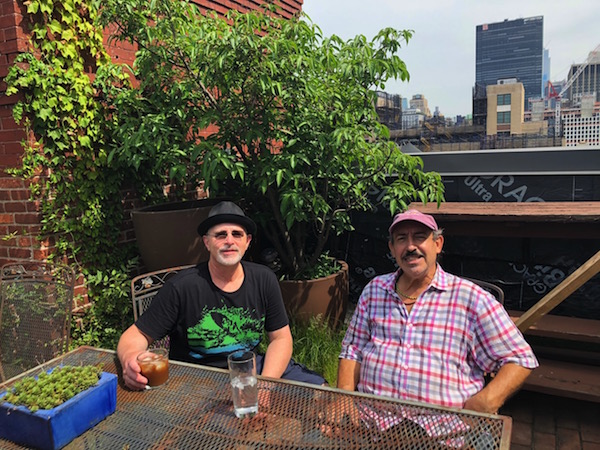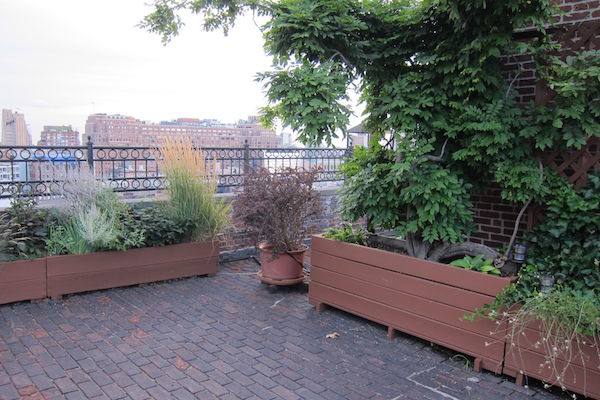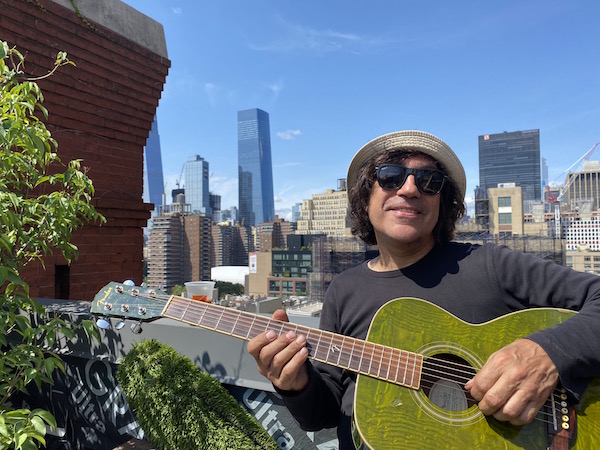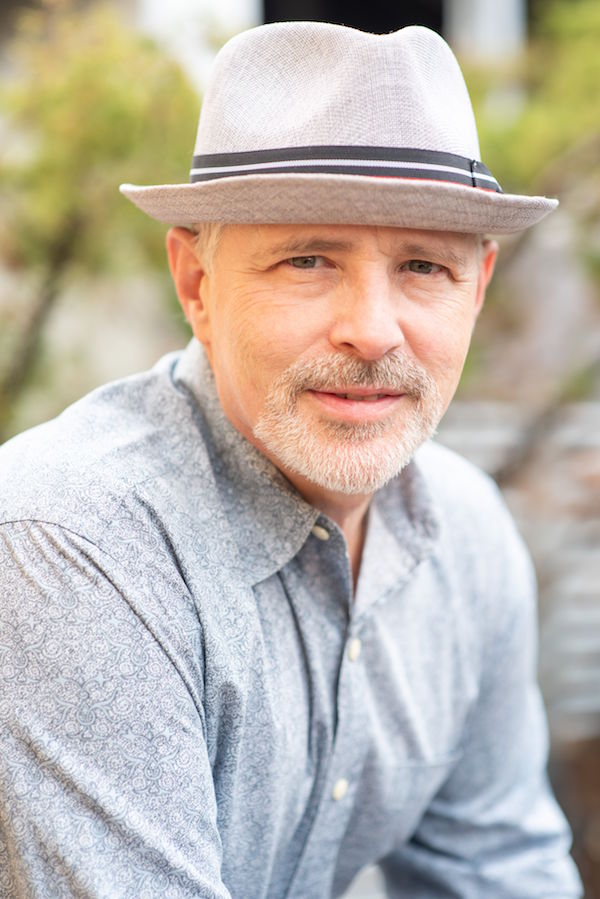
BY PUMA PERL | An elevator to the top floor, up two flights of stairs, and I’m sitting in a rooftop garden at West 23rd Street’s iconic Chelsea Hotel with photographer/filmmaker Zev Greenfield and irrigation specialist Marky Iannello, who maintains the greenery surrounding us.
Zev and Marky are childhood friends, Village kids who met hanging out at in the PS41 schoolyard, although neither attended that school. They were a “ragtag group,” as Marky describes them, a bunch of kids who did not confine themselves to any one block, or ethnicity. The freedom of spirit and acceptance of all kinds were passed on to them both by mothers who stepped outside of their boxes and assigned roles. As Zev put it, “We learned about choosing community, rather than doing what a community expected.”
Zev lives in the apartment directly below the gardens planted by his mother, the late Rita Fecher, an artist, filmmaker, and educator. He describes the apartment, which his mother rented in 1974, as “the family home”—a place that has survived a devastating fire and over 10 years of living in a construction zone. A place where he and his wife, Jodi Penzer, are now raising their own two children. A place where rooftop parties included artists, writers, and gang members, some of whom were interviewed by Ms. Fecher in the film Flyin’ Cut Sleeves, which she co-directed with Henry Chalfant, who is most acclaimed for his work documenting hip hop culture. (Click here for Fecher’s website, click here to purchase the film, and click here for Chalfant’s website.)
Zev’s story did not begin as a Village kid. At the time of his birth, his father, an Orthodox rabbi, was the Jewish chaplain at the Travis Air Force Base in Fairfield, CA. The family returned to New Jersey several years later, and his father was hired by a synagogue in Highland Park, NJ. His mother was not your typical rebbetzin.
“My mother was an artist since she was six years old,” recalled Zev. “She was very avant-garde, and my father was conservative.”
His mother studied art at Rutgers University, and would bring home her new theater friends, as she grew in her political awareness.
“As Abel Ferrara said,” explained Zev, she “was tired of living next to the Garden of Eden. She wanted to live in it,” and her Garden of Eden was New York City, specifically Greenwich Village. She began bringing her three sons into town on a regularly basis.
“We were weekend hippies,” Zev recalled, with a laugh. They would stay in people’s houses until, in ’67 or ’68, she packed up her three sons and, without a job offer or any way to make a living, moved them into a duplex on West 11th St. Her departure from the Orthodox community represented a break in her belief system. The divorce was bitter, but their new life was filled with adventure.
“She had a lot of guts,” said Zev. Her first job was teaching English in the South Bronx, where she originally met the gang members who appear in her film. She also met her second husband, a math teacher named Manuel Antonio Dominguez. He philosophized, recalled Zev, that “the smart kids were not coming to school. They were in the streets.” So Dominguez began sneaking some of the gang members in through the window, so they could attend classes.
During the teacher’s strike of 1968, in lieu of public education, Ms. Fecher obtained permission for Zev to travel with The Living Theatre, who used to crash at their 11th St. place. When they returned, his experiences made it difficult for him to fit into the regimentation of IS70, and he was enrolled in a Summerhill School in Upstate NY, which practiced non-compulsory education. “You played until you were ready to learn,” recalled Zev. “They had a darkroom in the basement, where we learned to develop and print. Many of us who are still friends today went on to become photographers.”

Returning to New York City after being “invited to leave,” his schooling continued at Source Academy. “I met a lot of other Village kids, some of them through Marky, who knew everybody.”
He started hanging out at the Chelsea Hotel when he was 15, although he didn’t move into his mother’s apartment until he was around 17. He and Marky share a wealth of experiences from the late ‘’70s early/’80s at the Chelsea Hotel.
“Sid Vicious was at the Chelsea, the New York Dolls, Johnny Thunders, Debbie Harry,” recalled Zev. “I remember the day when they were taking Sid out in handcuffs. I saw Nancy’s body bag as I was coming home from a night of debauchery. My mother knew a lot of the writers and artists. I was more into the rock and roll people. Marky was more in the inner circle than I was.”
Zev’s continuing education led him first to Goddard College, majoring in science and minoring in photography “until I realized I had it backwards.” He returned to New York City, and entered School of Visual Arts. “I’ve been taking pictures since I was ten,” he noted. It was the start of his lifelong passion to photograph people.
In 1991, following graduation, his brother, Dr. Haskel Greenfield, an archeologist, hired him as a photographer on his digs in Eastern Europe, including Serbia, Romania, and Hungary. Zev had always been interested in different cultures and in visually preserving what might otherwise be lost, so this, he noted, “gave me an opportunity to do things I’d only dreamed of doing before then. Traveling the world, photographing amazing things.”
In 1992, based on work submitted while traveling, he was awarded a grant by the WUJS (World Union of Jewish Students) Arad Arts Project, in Israel. “The intent of the project was to invite 13 artists from different mediums to interact with Israeli artists and have an exhibition,” noted Zev. “At first, I was going to photograph Bedouins. But I felt that I could never get inside of it, and also I couldn’t photograph the women.”
He decided upon Tel Aviv, which he described as “bustling, like New York City. The Central Bus Station is a tapestry of Israeli culture, Ethiopian Jews, Orthodox, every culture, and the streets are lined with marketplaces.” Early on, he also partnered with another artist and collaborated on a photo music video. He spent a year photographing in Tel Aviv, and the culmination was an exhibit in a museum in Israel. His exhibition was then sold to the bus station. “I photographed the reality of it, not the image they wanted to see, but they wanted it for historical purposes.”
While in Israel, he met the woman who would become his first wife. She hailed from Cape Town, South Africa, and he moved there with her, settling in Durban.
“It was an exciting time in South Africa,” he recalled. “Her father’s family, of Dutch Jewish descent, had been there for centuries. Her family was amazing, and all of a sudden I found myself with the offer of a business and a house on the beach, dreams I never could have imagined.”
His archeologist brother, unable to continue digs in Yugoslavia, relocated to South Africa and Zev began to venture out with him, studying different rites and rituals.
“My interest in ceremonial rituals brought me to wedding photography. It was a way to enter different cultures in happy times. Why,” he reflected, “wouldn’t a photographer want to witness happy moments, rather than death and despair?”
Zev traced this budding curiosity and capacity for immersion all the way back to his NYC roots, noting, “Growing up in the Village gives you an innate ability to maneuver and manipulate and exist. The survival skills picked up on the streets of New York are like nowhere else in the world, except maybe the streets of Brazil or Chicago. There are not a lot of places with the diversity that made me a person who was open and wanting to know about people.”
His mother, recalled Zev, made “everyone feel special. She wanted to know about everyone. She was a member of the world community, and brought us up that way, just like Marky and I were saying about PS41. South Africa offered me that chance. It was the happiest time of my life up to that point. As a permanent resident, I marched in protests and voted in the election that bought Mandela into power.”
“In 1996,” he continued, “I got divorced almost exactly on my wedding date.” He had to decide to either stay where he’d had a really good start or return home to New York. South Africa, at the time, was headed in a good direction, but the town he lived in had become plagued with violence and fear, so he decided to return home and moved back that year to the Chelsea Hotel. “I was newly divorced and had to figure out how to survive again.”
Although he hadn’t been building his New York reputation as a photographer, he was offered jobs by wedding photography studios, but did not feel the work they produced was in sync with his approach as a documentarian. When he met professional photographer Terry Gruber, he found a shared sensibility. (They were both in the forefront of changing the face of wedding and event photography.)
Studying Zev’s American event photography, I understood his philosophy, and his ability to be a fly on the wall, capturing the feeling of the moments, utilizing the same skills that had led him, in South Africa, to successfully photograph Indian and Zulu weddings and a host of different ceremonies. His photos reveal the emotional connection of his subjects, the small moments that make up the big picture. A bride tying a vibrantly silly sneaker. A mother and daughter sharing excited, joyful smiles. He continues to be represented by Gruber Photographers. He also became involved in filmmaking, and formed his own company, Milk & Honey Productions, for his videography. (Click here for the website, and click here for Milk & Honey’s Instagram.)
Life in the Chelsea Hotel is filled with bittersweet memories. Zev’s mother planted the gardens where we sat, and, until her death in 2003, celebrated birthdays and holidays, and regularly hosted gatherings of friends regularly.
“I was taking care of her up until she died,” said Zev. “It was a horrible year.” He had endured the breakup with his fiancée and the sudden loss of his cat, and did not yet know that the foundation had been laid for his life to turn around, once again.
Sometime earlier, he’d suffered a back injury and had been treated by a physical therapist named Jodi Penzer. She was also an actor and dancer who had traveled the world in her work, and they became friends. The last year his mother was alive, the family celebrated Rosh Hashanah on the roof, and, as was their custom, invited all their friends.

Still engaged at the time, Zev thought it would be nice to extend an invitation to Jodi, albeit with a secret plan to play matchmaker for his brother, Avi. She accepted the invite and met the family, but the matchmaking effort did not take off. Following the loss of his mother, he continued to hold gatherings on the roof, to which he invited her. She wasn’t able to make it for about a year, by which time he was single again. When she finally came to a party in July 2004, “She never left,” said Zev, “and she moved in by the end of the year.”
Penzer helped in organizing his late mother’s belongings and artwork, and got to know who his mother was. Eventually, they changed the apartment into their own home, but the archiving was very important to the family. “I couldn’t have done it without her,” he stated.
By 2009, Zev had proposed to Jodi, and they’d talked about getting married in South Africa. Quixotically, Jodi’s brother, Michael, attended a benefit that included a silent auction; one of the prizes was a trip for four to Africa. He arranged with Zev to bid on it, and they won. Jodi’s parents, a Jewish couple who had adopted her from Korea when she was two, had only one request, which was to be in attendance no matter where or how the wedding took place. They had no idea whether they could find a rabbi.
But they forged ahead, concluding their three-week trip in a Tanzanian village—where they followed the rule of being adopted by Maasai tribal members, in order to get married. Zev brought four poles and a blanket to serve as a chuppah, and a glass stolen from the hotel for the groom to stomp on, in accordance with Jewish tradition. Watching the video, I especially loved the joyous hora at the end, Americans and Africans dancing together.
Sitting in the garden with Zev and Marky, looking north to the Empire State Building and the city’s landscape, and listening to Zev’s stories, it’s almost easy to forget the crisis we are living through.
Almost.
From the very onset of COVID-19, Zev’s focus has been to care for, and ensure the safety of, his two children. At the time of our rooftop interview in late July, he was looking forward to a job the following week—the first, he noted, “since February.”
Still, there is a peace in this garden, started by the late Rita Fecher, tended by Jodi Penzer, and, since 2013, maintained by Marky, an irrigation specialist with his own company, INTOWNIRRIGATION LLC. Marky has never strayed from his rock and roll heart, or stopped supporting the New York scene.

A few years ago, Marky hired musician Joff Wilson (Bowery Boys, SoulCake) as his assistant; it seems destined for the paths of these men to cross. All three had strong, independent mothers, love the rock and roll life and the garden, and believe strongly in community.
Joff (who was interviewed separately for this article) is originally from Rochester, where his mother owned a flower shop, and, supported by Zev, has included this Chelsea Hotel rooftop in his live streams.
“I thought it would be a nice way to start a rooftop series,” he recalled. “I asked Zev and he said ‘anytime.’ I hardly knew him, that’s how cool he is. A great creative soul. So that was the birth of Coffey with Joffy, and an occasional guest.”
He and his band, SoulCake, have been resourceful, playing in parks, Upstate, and in restaurants catering to outdoor diners. He finds working in the garden “calming.” Marky shared with us his insights about the importance of plants in our lives: “When you breathe out carbon dioxide, they breathe out air and oxygen; that’s like a blues thing, a call and response, a cycle of life, a Zen moment, you’re talking to them like a sentient being… The ground is connected to the entire world.” (Click here for SoulCake on Facebook, and click here for the band’s Instagram.)
Despite the trying times, Zev remains grateful for his experiences, past and present, saying, “I was over 50, never thought I’d have kids. I want you to understand the miracles she (Jodi) brought into my life.”
Two of those miracles are their son and daughter, born after Jodi’s 2004 diagnosis and successful treatment for breast cancer. They had been told chances were slim, that they’d successfully conceive after freezing her eggs, and defied the odds, not once, but twice.
“I never thought,” said Zev, with gratitude, “I’d have the life that I have today.”

Chelsea Community News is made possible with the help of our awesome advertisers, and the support of our readers. If you like what you see, please consider taking part in our GoFundMe campaign (click here). To make a direct donation, give feedback, or send a Letter to the Editor, email scott@chelseacommunitynews.com.

Pingback: หวยหุ้นดาวโจนส์
Pingback: cinemarule
Pingback: ฝากถอนเงิน ผ่านระบบออโต้
Pingback: anton austria weed
Pingback: เครื่องทำน้ำแข็ง
Pingback: ผลิตกระเป๋าผ้า
Pingback: car detailing
Pingback: https://vhnbio.com
Pingback: rumah dultogel
Pingback: Buy MODEL 2020 WAYPOINT 6.5 CREEDMOOR RIFLE, ADJUSTABLE – EVERGREEN Online
Pingback: ไพ่แคง คืออะไร
Pingback: sex trẻ em
Pingback: รับเหมาไฟฟ้า
Pingback: สติ๊กเกอร์ฉลากสินค้า
Pingback: barber prahran
Pingback: โปรแกรมอพาร์ทเม้นท์
Pingback: guns for sale
Pingback: https://exotichousedispensary.com/product/boutiq-vapes/
Pingback: 티비위키
Pingback: click for more
Pingback: addiction recovery
Pingback: staycation mushroom microdosing
Pingback: read this article
Pingback: Plus d'informations
Pingback: sbobet
Pingback: สล็อตวอเลท ไม่มีขั้นต่ำ
Pingback: best dumps store
Pingback: Mental health | WriteAPrisoner.com
Pingback: Buy Grams of weed online
Pingback: send flowers to ukraine
Pingback: how to get free robux